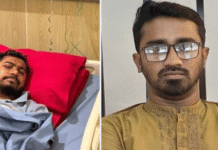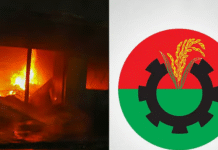Shahid Islam
If it doesn’t work, change it, so goes the saying. Whatever progress Bangladesh aims to achieve through united efforts, much more is being squandered in the political uncertainty that’d gripped the nation. And, when the landmarks of the past are considered as yardsticks to go by, harmony amidst hesitation had been the panacea that had cured all the major socio-political afflictions of this nation. This time too, it can’t be any different.
PM mulls early election
According to a source close to the government, Prime Minister Sheikh Hasina is mulling seriously the prospect of an election as early as by March 2017, all things being in their respective slots. “She had assigned some experts to prepare an alternative mechanism of an election-time government if the BNP-led opposition parties once again reject the existing constitutional guidelines to dictate the terms of the electioneering,” said the source. “BNP will also get the opportunity to moot its own formula, which must not temper with the constitution,” the source added.
Notwithstanding that the existing constitutional set up is the main hurdle to the holding of a fair and credible election, yet, if it turns to be true, post-Eid political discourses could center around the prospect of an early election. Moreover, some senior policy makers of the government think the ruling AL is in a much better shape to face an election challenge in the immediate future than any time later.
They maintain, not only the challenges posed by religious extremists through terror attacks is the main variable that can turn the political winds abruptly against the incumbent regime, the economy has already been battered by a staggered flood compounded further by the sudden influx of huge waters through over 100 gates flung open by India. Added to it is the likelihood of reduced export and remittance earning, as well as increased unemployment in agriculture, industries and a host of service sector outlets; the hospitality and the tourism sectors being the most affected by the terror-induced panic that shows no sign of abating. For the main opposition BNP too, election cannot brook further delay amidst serious anxiety among the party loyalists who’re mostly on the run due to the fear of being arrested, kidnapped, or being barred from contesting future polls by court orders.
Hard bargain
While it’s easily said than done, in so far as the consensus of the two diametrically opposing political camps – BNP and AL – are concerned, ruling AL will harp on the constitutional stipulations to be followed, and the polls taking place under the incumbent regime; something BNP can only accept at a great loss to its credibility due to its negation in 2015 to join the polling under the same set up. As well, the new sedition charge brought against the BNP’s exiled senior vice chairman, Tarek Rahman, and the likely conviction of Khaleda Zia in a number of charges, are the potent arsenal that the incumbent regime will use to leverage out some niche in a bitter bargain that will precede the next polling.
The BNP is far from facing a demise, as propaganda hypes try to make us believe. Besides, the evolving political dynamism of the nation since its inception has always been a curious mix of confrontation and cooperation. It’s no secret that the time now is more precarious than any time before. The menacing militancy factor seems to have galvanized the minds poised for cooperation despite the government’s determination to knock the Jamaat-e-Islami (JI) out of the political orbit while the BNP too seems willing to go without the JI for the sake of democracy and greater interest of the country, if the government concedes on holding an early election that will ensure fairness and inclusivity. For the BNP, early election is not only a necessity, it’s a promise that the PM had reneged. Shahidul Hoque, Inspector General of Police, had disclosed that the militants killed in recent months are mostly from the Chatro Shibir, the student organ of the JI. No one knows exactly who the alleged terrorists killed by police are, but the IGP had hammered another political nail in the JI’s coffin by disclosing in public such an ‘unverified assertion.”
JI and its future
The Ji is already barred from contesting in future polling while the next step of the government is to prove with credible evidence that it’s a terrorist outfit deserving removal from the EC’s list of the 40 registered political parties expected to contest the next election. Meanwhile, it is also being rumoured that the JI will either merge with the BNP, or with another political party of Islamic vintage which is learnt to be waiting to be launched. In any case, the BNP will perhaps lead the combined nationalist-Islamist camps which are drawing more public sympathy these days due to rising anti-Indian feelings stirred by the AL’s appeasing policies toward India at the cost of jeopardized national interests.
Democracies like Canada or Japan often call for snap polls whenever the incumbent regime faces questionable challenges in governance. After all, patriotism is a virtue only when put to test, and, bumping onto protracted political deadlocks testing the sagacity of the politicians is not something wonder-evoking. In Bangladesh, all such seemingly irreconcilable bumps were bypassed in the past through compromise and consensus.
Consensus ousted military dictator HM Ershad in 1990 and installed the Justice Shahaduddin regime as the interim caretaker, which led to further strengthening of the electoral system by inducting into the constitution in 1996 the 13th amendment and the caretaker system. To the contrary, in 2007, lack of consensus led to an abrupt military intervention and to the partisan behavior of the military-backed regime, making the AL’s coming to power with two-third majority so that it could play with the constitution in the manner it wanted. From that perspective, the ongoing crisis is as much constitutional, as it’s electoral.
Consensus blossoms
Apparently, since 2009, political conflict had reigned supreme and added to the landslide deterioration of the political climate to such an extremity that an otherwise peaceful population had now turned disillusioned, apathetic and agnostic about the massive growth of Islamic militancy, crime bonanza and unbridled corruption and cronyism. The enfeeblement of the vital national institutions, including the mass media, had been the unavoidable corollary of a major degeneration that had roiled the nation since 2009. Today, politics is stagnant, as are hopes of a better future which leaders are supposed to inject into and inspire upon. Even the judiciary-mandated contempt of the court crime and breach of oath doesn’t cost a cabinet minister his job while people are randomly taken to the DB and RAB offices for torture and extraction of grafts. More ominous are the facts that teachers and students join hands to propagate chaos and communal disharmony amidst innocent people being arrested, kidnapped and killed under the pretext of fighting terror.
The AL still has a sound vote bank because the PM had launched another of her cardinal electoral promise fulfilling mission to offer rice to the poor at taka ten per kilogram, which is truly laudable. Now, she should make personal efforts to reach out to all the stakeholders with the spirit of bipartisan patriotism and urge the opposition parties to accommodate with the government in a scheme that will bring back true democracy to a nation that had shed precious blood and sweat for it, time and again.
Alternately, militant Islamists will hijack the show sooner as they’re led by much more intelligent people than what the main political parties have in stock. An inclusive election will allow the nation to blossom away from stagnation and make democracy the guiding beacon for the posterity.









